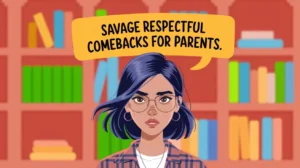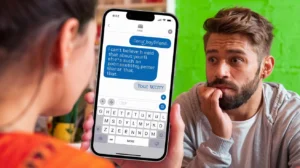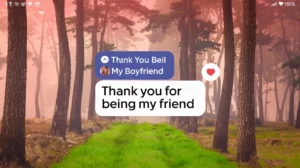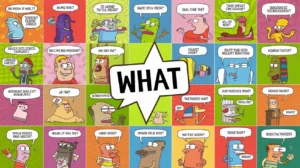Hearing “I don’t care” can sometimes feel dismissive or frustrating, especially if you’ve put effort into expressing your feelings or opinions.
But instead of letting it get under your skin, why not have a few clever comebacks ready? With the right response, you can deflect negativity with confidence and even turn the conversation around.
Here are 30 creative comebacks that will help you handle “I don’t care” with poise and wit.
30 Comebacks for “I Don’t Care”
1. “Well, I do, so it’s worth talking about.”
This comeback shifts the focus back to your perspective, showing that what you’re discussing is important to you, even if it’s not to the other person.
Example:
Person A: I don’t care about your plans.
Person B: Well, I do, so it’s worth talking about.
2. “That’s okay; I’m not looking for your approval.”
This response asserts your independence and confidence, suggesting that you don’t need validation from the other person.
Example:
Person A: I don’t care about your opinion.
Person B: That’s okay; I’m not looking for your approval.
3. “I understand. But I still wanted to share.”
This reply acknowledges their indifference while reaffirming your desire to communicate, showing that you value sharing your thoughts.
Example:
Person A: I don’t care about the details.
Person B: I understand. But I still wanted to share.
4. “Noted. I’ll still move forward with my plans.”
This comeback shows that their lack of interest doesn’t deter you from pursuing your own goals, displaying resilience and determination.
Example:
Person A: I don’t care what you’re doing.
Person B: Noted. I’ll still move forward with my plans.
5. “That’s fine; I’m not doing it for you.”
This response makes it clear that your actions or decisions aren’t influenced by their opinion, highlighting your personal motivation.
Example:
Person A: I don’t care about your project.
Person B: That’s fine; I’m not doing it for you.
6. “I’m glad you’re honest, but I still think it’s important.”
This reply acknowledges their honesty but maintains that your perspective holds value and importance.
Example:
Person A: I don’t care about your concerns.
Person B: I’m glad you’re honest, but I still think it’s important.
7. “Fair enough. I’ll just keep you updated anyway.”
This response respects their indifference but shows that you still want to keep them informed, demonstrating persistence.
Example:
Person A: I don’t care about the outcome.
Person B: Fair enough. I’ll just keep you updated anyway.
8. “I see. But this is still a priority for me.”
This comeback emphasizes that, despite their lack of interest, the issue remains significant to you.
Example:
Person A: I don’t care about your project.
Person B: I see. But this is still a priority for me.
9. “That’s okay; I care enough for both of us.”
This response shows that you’re willing to take on the burden of concern, even if they choose not to engage.
Example:
Person A: I don’t care what happens.
Person B: That’s okay; I care enough for both of us.
10. “I get it. But I’m still going to pursue it.”
This comeback acknowledges their indifference but reaffirms your commitment to whatever you’re discussing.
Example:
Person A: I don’t care about the plan.
Person B: I get it. But I’m still going to pursue it.
11. “Thanks for letting me know. I’ll keep going regardless.”
This response shows appreciation for their honesty and confirms that their opinion won’t affect your course of action.
Example:
Person A: I don’t care about your opinion.
Person B: Thanks for letting me know. I’ll keep going regardless.
12. “Noted. I’m still going to make it happen.”
This reply reinforces your determination to proceed despite their lack of interest.
Example:
Person A: I don’t care about your goals.
Person B: Noted. I’m still going to make it happen.
13. “That’s okay; I’m still invested in it.”
This response acknowledges their indifference but maintains your own level of investment and interest.
Example:
Person A: I don’t care about your proposal.
Person B: That’s okay; I’m still invested in it.
14. “I understand. I’ll keep my focus where it matters.”
This comeback demonstrates that you’re not letting their indifference shift your focus away from what’s important to you.
Example:
Person A: I don’t care about your plans.
Person B: I understand. I’ll keep my focus where it matters.
15. “Thanks for your input. I’m still moving forward.”
This reply acknowledges their feedback while confirming that you’ll proceed with your plans.
Example:
Person A: I don’t care about your ideas.
Person B: Thanks for your input. I’m still moving forward.
16. “I see. I’ll just keep this between us.”
This response shows respect for their indifference by choosing to keep the matter private while maintaining your own stance.
Example:
Person A: I don’t care what you’re doing.
Person B: I see. I’ll just keep this between us.
17. “That’s fine; I’m still passionate about it.”
This comeback reaffirms your passion and commitment, regardless of their level of interest.
Example:
Person A: I don’t care about your project.
Person B: That’s fine; I’m still passionate about it.
18. “Understood. I’m going to keep pursuing it.”
This response indicates that their lack of interest won’t deter you from continuing with your efforts.
Example:
Person A: I don’t care about your ambitions.
Person B: Understood. I’m going to keep pursuing it.
19. “Thanks for letting me know. I’ll carry on regardless.”
This reply acknowledges their indifference but reaffirms your intent to continue with your plans.
Example:
Person A: I don’t care about your ideas.
Person B: Thanks for letting me know. I’ll carry on regardless.
20. “I appreciate your honesty. I’m still committed.”
This response acknowledges their honesty and confirms your own commitment to the matter.
Example:
Person A: I don’t care about your concerns.
Person B: I appreciate your honesty. I’m still committed.
21. “That’s alright; I’ll keep moving forward with this.”
This comeback shows that you’re undeterred by their lack of interest and will continue pursuing your goals.
Example:
Person A: I don’t care about your project.
Person B: That’s alright; I’ll keep moving forward with this.
22. “I get it. I’m still excited about it.”
This response acknowledges their indifference while emphasizing your own enthusiasm and excitement.
Example:
Person A: I don’t care about your plans.
Person B: I get it. I’m still excited about it.
23. “Thanks for the feedback. I’ll continue regardless.”
This reply shows that you appreciate their feedback but will persist with your plans.
Example:
Person A: I don’t care about your proposal.
Person B: Thanks for the feedback. I’ll continue regardless.
24. “That’s okay; I’m still motivated to see it through.”
This response indicates that their indifference doesn’t affect your motivation to continue.
Example:
Person A: I don’t care about your goals.
Person B: That’s okay; I’m still motivated to see it through.
25. “I understand. I’m still passionate about it.”
This comeback reinforces your own passion and commitment, despite their lack of interest.
Example:
Person A: I don’t care about your project.
Person B: I understand. I’m still passionate about it.
26. “I see. I’ll keep pursuing it with or without support.”
This response shows that you’re determined to continue regardless of their opinion or support.
Example:
Person A: I don’t care about your ideas.
Person B: I see. I’ll keep pursuing it with or without support.
27. “Thanks for letting me know. I’m still moving ahead.”
This reply acknowledges their indifference while affirming your intent to keep going with your plans.
Example:
Person A: I don’t care about your proposal.
Person B: Thanks for letting me know. I’m still moving ahead.
28. “Noted. I’ll still give it my best effort.”
This response shows that, despite their lack of interest, you’re committed to putting in your best effort.
Example:
Person A: I don’t care about your plans.
Person B: Noted. I’ll still give it my best effort.
29. “That’s fine; I’m still excited about it.”
This response communicates that their lack of interest doesn’t dampen your enthusiasm or excitement.
Example:
Person A: I don’t care about your ideas.
Person B: That’s fine; I’m still excited about it.
30. “I understand your point. I’ll keep working on it.”
This reply acknowledges their perspective while confirming your commitment to continue working on your plans.
Example:
Person A: I don’t care about your goals.
Person B: I understand your point. I’ll keep working on it.

Justin Taylor is the innovative force behind ReplySwift.com. With a knack for creating quick, witty, and effective responses, Justin empowers others to communicate more confidently. On ReplySwift.com, he offers expert tips, customizable templates, and valuable insights to enhance your reply game.












